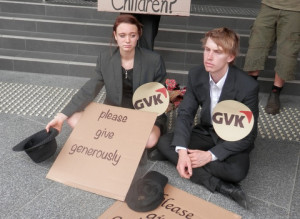
Queenslanders protest at the Annual General Meeting of rail company Aurizon in Brisbane to demand the company pull out of plans to build a railway line to connect new coal mines in the Galilee Basin to the controversial port development at Abbot Point beside the Great Barrier Reef. Photo (c) Greenpeace Australia Pacific
14 November 2013
Shareholders of quite varying and exotic strains descended on the Aurizon AGM on Wednesday.
A colourful and vibrant protest outside suggested that things were going to be a little different from the usual fare of remuneration packages and directorship self congratulation.
For many garden variety shareholders in attendance, it was probably a revelation to discover that Aurizon Ltd was the possible three billion dollar saviour for a toxic deal that could open up the Galilee Coal basin, albeit a saviour potentially trailing a $3 billion stake in a stranded asset, compliments of dangerously debt laden GVK.
During question time, proxies and shareholders put concerns regarding exacerbation of climate change, potentially irreversible damage to the natural environment in the Galilee and the health impacts of coal dust.
Chairman John Prescott gave ham-fisted replies, stating that the impacts of the project were only hypothetical, as Aurizon had not signed the deal.
But questions pertaining to the deal itself were perhaps at the forefront of the shareholder’s minds, with a potential $3 billion at stake for a company with a $10 billion market value.
Erland Howden of Greenpeace queried the board as to what the implications for shareholders might be if GVK were to default on its loans and be subsumed by creditors, leaving Aurizon with a $3billion asset that was not generating revenue, and thus effectively stranded.
Prescott responded by saying that Aurizon would only engage in activity that increased shareholder value. It would seem that if the project is not viable, Aurizon will not have anything to do with it. Fair enough.
My question to the increasingly exasperated Chairman was regarding Aurizon’s inability to deal with risks associated with stranded assets. Have a look and be patient as the Chairman tries to come up with an answer.
Aurizon is a monopoly, and so it’s Weighted Average Cost of Capital (WACC) (and revenue) must be approved by the Queensland Competition Authority (QCA). But the higher the WACC, the higher the haulage costs for coal miners. Hence, any application for an increase in WACC is met by loud protest from the Queensland Resources Council (QRC).
So a large risk like… taking GVK as an investment partner, dishing out $3bn for a 51% share in a project that may not have a payback in a commodity that could be in structural decline … these risks likely can’t be rewarded by adjusting the WACC (because of a hostile QRC). So who would take the hit of stranded asset risk? Shareholders, perhaps?
For a deal that might gamble 30% of the value of his company, Prescott seemed rather oblivious as to what the company might do in the event of a GVK default. It seemed that John Prescott had not even considered the deal worth his contemplation.
But it seems that shareholders are beginning to take it into consideration… Aurizon’s share price fell 3.33% on the day of the AGM, the largest daily fall in at least a month.
It would seem that the financial, environmental and social realities of opening up the Galilee basin are yet to be seriously entertained by Mr Prescott. It’s almost as if the Galilee is not on Aurizon’s horizon.
